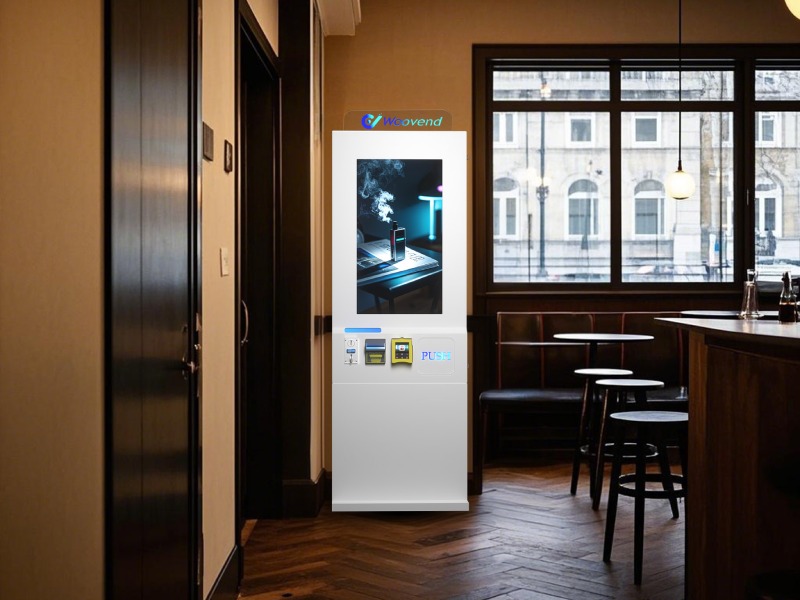E-cigarette vending machines have become a topic of significant debate in recent years. As the popularity of vaping grows, questions about the legality of these vending machines in various regions have surfaced. While these machines offer a convenient way to purchase e-cigarettes, their legality is subject to a range of regulations that vary from one country to another. In this article, we’ll explore whether e-cigarette vending machines are legal, the regulations involved, and how this could evolve in the future.
Understanding E-Cigarette Vending Machines
E-cigarette vending machines are self-service machines that allow customers to purchase vaping products, including e-cigarettes, e-liquids, and accessories. These machines are often located in places like airports, shopping centers, and convenience stores, where they provide a quick and easy way to buy vaping products without the need for direct human interaction.
The rise of vaping in recent years has driven demand for more accessible ways to purchase e-cigarettes. As a result, vending machines have become a popular method of distribution. These machines are typically stocked with various e-cigarette brands, flavors, and nicotine strengths, catering to a broad audience of vapers.
The Legal Status of E-Cigarette Vending Machines in Different Countries
E-Cigarette Vending Machines in the United States
In the United States, the legality of e-cigarette vending machines is largely governed by regulations from the Food and Drug Administration (FDA). The FDA oversees the sale of tobacco products, which includes e-cigarettes. In 2016, the FDA expanded its authority to regulate e-cigarettes and vaping products under the Family Smoking Prevention and Tobacco Control Act. This includes setting age restrictions for the sale of e-cigarettes and banning sales to minors.
While the FDA provides overarching regulations, the legality of vending machines varies by state. Some states have stricter controls on the sale of e-cigarettes through vending machines, including the requirement for age verification. Others may have local regulations that impose further restrictions, such as banning e-cigarette vending machines in certain public places.
Laws in the United Kingdom
In the United Kingdom, the sale of e-cigarettes is regulated by the Tobacco and Related Products Regulations (TRPR), which are aligned with European Union laws. Vending machines selling e-cigarettes are subject to strict regulations to ensure that only adults can purchase vaping products. The UK requires age verification mechanisms, including the use of identification to confirm the purchaser’s age.
While vending machines are legal in the UK, they must comply with the same laws governing the sale of e-cigarettes in other retail settings. These machines cannot be located in places where children and young adults have easy access, such as near schools or in public spaces frequented by minors.
European Union & Other Global Perspectives
Across the European Union, the sale of e-cigarettes through vending machines is similarly regulated under the Tobacco Products Directive (TPD). The directive sets out rules for e-cigarette packaging, labeling, and advertising, as well as restrictions on sales to minors. Each EU member state has the authority to implement its own laws based on these guidelines, which means that the legality of vending machines can vary across countries.
In other parts of the world, such as Australia and Canada, the sale of e-cigarettes is highly regulated, and vending machines are often prohibited. These regions have stricter controls due to health concerns surrounding vaping and the potential risks of easy access to e-cigarettes through vending machines.
Legal Challenges and Controversies Surrounding Vending Machines
Age Verification and Accessibility Issues
One of the major challenges with e-cigarette vending machines is ensuring that they adhere to age restrictions. Vaping products are intended only for adults, but verifying age in a vending machine setting can be problematic. In many cases, machines use ID scanning or other forms of age verification, but these systems are not foolproof. This opens the door to potential misuse, where underage individuals could gain access to e-cigarettes if the machines’ age-checking systems fail.
Moreover, the ease of access to e-cigarettes through vending machines may make it more difficult to prevent minors from purchasing these products, especially in public spaces where the machines are readily available.
Health Concerns and Regulatory Scrutiny
Health organizations have raised concerns about the rise in vaping, particularly the impact on young people. The widespread availability of e-cigarettes through vending machines has drawn the attention of regulatory bodies who are concerned about the potential health risks associated with vaping.
Some health experts argue that the convenience of vending machines encourages more people, including minors, to start vaping. This has led to calls for stricter regulations and even the ban of e-cigarette vending machines in certain areas. Health organizations are pushing for tighter controls to ensure that vaping remains a controlled, adult-only activity.
The Debate Between Convenience and Safety
The convenience of purchasing e-cigarettes from a vending machine is undeniable. For many adult vapers, it offers a fast, easy way to buy their products. However, the potential safety concerns associated with the machines have raised questions about their broader impact. Striking the right balance between accessibility and control is a major point of debate for lawmakers.
While e-cigarette vending machines offer a level of convenience, critics argue that they might encourage the normalization of vaping, particularly among younger audiences who might otherwise be deterred by more traditional purchasing methods.
Are E-Cigarette Vending Machines the Future of Vaping Sales?
Technological Advancements in Vending Machines
The future of e-cigarette vending machines may lie in technological innovations. Modern vending machines are becoming more sophisticated, with advanced features such as AI-driven age verification systems and contactless payments. These innovations aim to enhance the user experience while also improving compliance with age restrictions and other regulations.
Smart vending machines may become more common, particularly in high-traffic areas like airports or large shopping centers, where the demand for quick, convenient access to vaping products is high. As technology evolves, vending machines may become a more viable option for both consumers and businesses.
Potential for E-Cigarette Vending Machines in 2025 and Beyond
Looking ahead, the future of e-cigarette vending machines is uncertain. In 2025, there could be further regulatory changes, especially as more research is conducted on the health impacts of vaping. Governments may tighten regulations even further, or they could explore new ways to make vending machines safer and more accessible to responsible adults.
As the industry continues to grow, we may see more businesses investing in vending machine technology to ensure compliance with the law while providing a modern, efficient sales channel for e-cigarettes.
Conclusion
E-cigarette vending machines are legal in some parts of the world, but their status varies significantly depending on the country or even local regulations. While these machines provide convenience for adult consumers, they also pose legal challenges, particularly around age verification and accessibility. As the vaping industry continues to evolve, the legal landscape surrounding e-cigarette vending machines will likely change. It is crucial for both consumers and businesses to stay informed about these developments to ensure compliance with the law. Whether you’re a vaper or a business owner, understanding the legal framework surrounding vaping products is essential for navigating this complex issue.
Related attachments:
E Cigarette Legal Landscape 50 State Review June 2019 in USA.pdf




